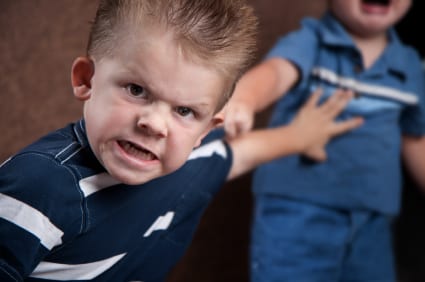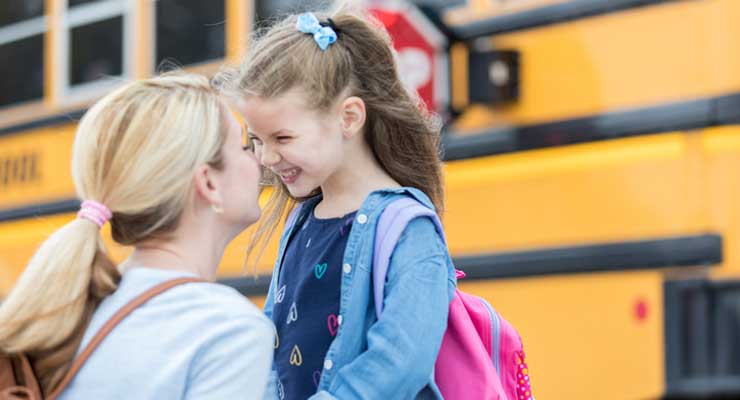The following is a guest post from Kristen Wolf, author of The Way.
Today I watched something unfold that upset me as a mother.
My five-year-old son and I had come to the zoo where one of his friends was having a birthday party. The group was a mix of boys and girls, with several mothers in attendance. We parents knew each other by sight, as our children attended the same school, but many of us had never spent any time together. So our outing was to be a “chit chat event” as I like to call them.
Given that it was the first sunny day after a long cold spell, many of the animals had come out to stretch and frolic. Thrilled to have so many creatures on view, our kids scampered from one enclosure to the next, roaring, squawking, and squealing with delight. It promised to be a good day.
Until we got to the jungle gym.
The zoo’s playground featured colorful, life-size animals and the kids immediately hopped up. Nothing seemed awry until one boy, Brendan, started taunting another boy, Kirby. I knew Brendan from school. He and my son sometimes played together. He was an energetic kid who, I’d noticed, was sometimes a little aggressive.
Why Brendan had singled out Kirby that afternoon I don’t know. Especially since it was clear Kirby wanted nothing to do with him. The verbal taunting escalated to a few jabs in the ribs.
By now, myself and a few other moms were craning their necks, looking for Brendan’s mom who we all knew was there. When I spotted her on the perimeter, I was surprised to see her calmly watching the interaction. A vacant smile on her face.
I saw a few looks pass between the moms, but so far, no one wanted to take the taboo action of disciplining a child in front of their parent.
Brendan gave Kirby a solid push. Kirby ran away and took cover behind a zebra. Brendan pursued him. Not in a friendly way. I glanced again at Brendan’s mother. No reaction.
Brendan pinned Kirby against the zebra, trapping the smaller child with his body. Intimidating him with his size. Kirby struggled to get free. Brendan then reached out and grabbed him by the collar.
“Hey Brendan!” I warned before I could stop myself. But it was too late. The five-year-old drew back his fist, quick as a shot, and sent it flying into Kirby’s face.
Every mother on that playground heard the “whack.”
Kirby dropped to his knees and I rushed out. He cried as I lifted him, blood already running from his lip.
Finally, Brendan’s mother headed for her son. She guided him, almost reluctantly, by the elbow.
In a whispery voice, she told him “that wasn’t nice” and that he needed “to take it easy.” But the apologetic tone in her voice undermined any semblance of authority.
Brendan responded to her with utter disregard. Without acknowledging that she had spoken, he threw off her hold and ran back out to play. She called after him a few times, but he ignored her.
His mother then turned to face us, wagging her head, and pulling an exasperated “boys will be boys” face.
Meanwhile, I performed some “Kleenex triage” on Kirby and soon had him back out with the other kids. The rest of the party went off without a hitch and was deemed a great success.
But that night, I couldn’t stop thinking about the incident. For some reason, it had really gotten under my skin.
Having witnessed lots of unsavory interactions between kids, I wondered what had gotten me so riled up about this event in particular?
In thinking about it, I realized I wasn’t bothered by the fact that Brendan had been rough — I’d seen plenty of playground brawls. Nor was I bothered by the bloody lip. I’d definitely seen worse.
But what had me troubled — in fact, appalled — was the interaction between Brendan and his mother. What her response demonstrated was a belief in the notion that boys possess an inherent right to be violent and aggressive. That they’re, in fact, entitled to bad behavior because that’s “just how they are.”
However popular this notion, I’ve never bought into it. And I disagree with it even more vehemently now that I’m the mother of a son. I’m not arguing that differences don’t exist between girls and boys. Nor am I claiming that boys don’t have a biology that instills them with the tendency to be more aggressive.
But I am arguing that it’s wrong to ignore, even condone, harmful behavior — no matter its cause. And I’m equally asserting that no child, boy or girl, should be raised as if they have an inherent right to behave in ways that hurt others.
As a mom, I’ve been around enough boys to know that they are not born with a callous predisposition to wreak havoc. On the contrary! My son, like many of his friends, can be as sensitive, empathetic, and compassionate as any girl his age. Sometimes even more so! Does he still wield sticks and hit things? Does he build structures only to smash them apart? Does he relish running over things with his bike? Yes, yes, and yes!
But here’s the difference: Unlike Brendan, my son is being raised under the mantle of “do no harm.” Not under the assumption that he can’t be held responsible for his actions. At our house, a line is drawn at behaviors that hurt someone or damage property. That limit is crystal clear and non-negotiable. And, popular notions aside, neither my son nor his friends seem to have any trouble understanding, or abiding by, this basic requirement.
I think why I find the event at the zoo so upsetting is because when you extrapolate out from it, when you multiply it by hundreds of thousands of boys around the world — who eventually turn into men — we see how it amplifies the possibility of grave and global violence, such as we are witnessing today in many parts of the world.
That’s not the dream we have for our children, nor for children of the future.
So what can we do? As mothers, as parents, we can choose to swim against the prevailing opinion that expects so little of our sons, and start holding them accountable for their behavior.
And we can start believing that the greater power inside them is not the tendency to damage our world, but to change it, for the better.
Kristen Wolf, author of The Way, is a mother, writer, and filmmaker living in the Rocky Mountains. She is a Phi Beta Kappa graduate of Georgetown University and holds an M.A. in creative writing from Hollins University. This is her first novel.





